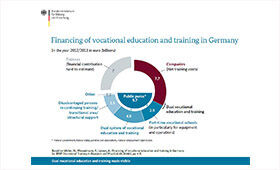Legal framework and financing of the German dual VET system
The legal framework and the financing of the German dual vocational system is based on a long tradition and includes various parties who are involved in this framework.
Legal Framework of the dual system
The German Vocational Training Act (Berufsbildungsgesetz (BBiG)) and the German Crafts and Trades Regulation Code (Handwerksordnung (HwO)) form the legal framework for the development of the German TVET system. All parties involved act consensus-oriented according this framework. These two instruments set out fundamental standards for the company-based part of dual VET, including creation of the general conditions that apply to aspects such as vocational training and the examination system. The central element within the system is the training regulation prescribed by the BBiG/HwO. These are enacted for every state recognised training occupation by the relevant ministry responsible.
The training regulations have a central role in the Vocational Training Act. They form the framework for regulating the occupations. A training regulation regulates (article 5 paragraph 1 BBiG)
- the designation of the training occupation,
- the duration of the training – which shall be not less than two and not more than three years,
- the description of the training occupation – the typical “skills, knowledge and capabilities” of the profession in summary form,
- the framework training curriculum – a guide to how the teaching of skills, knowledge and capabilities is to be structured in terms of content and time,
- the examination requirements.
These provisions describe the minimum requirements for a modern course of training. They define the standards, i.e. the currently indispensable skills, knowledge and capabilities of a qualified specialist, as well the scope of his or her practical activity in order to be able to integrate additional qualifications as well as hitherto unforeseeable future developments in education and training.
The Board of the Federal Institute for Vocational Education and Training (BIBB) is the advisory board for the central government in all issues relating to vocational education and training.
Financing of the dual system

The system of dual vocational education and training exerts far-reaching effects in macro-economic and labour market policy terms. One example of this is the fact that a major contribution towards the financing of the system is made by the companies providing training themselves, and the resultant low level of youth unemployment means that a very small burden is placed on the social systems.
Alongside the investments made by the companies in securing a supply of up-and-coming skilled workers and in providing training to young people, other participants in the complex financing system include the public purse (the federal states, the Federal Government, the Federal Employment Agency) and the trainees themselves. The contribution made by the trainees in this regard primarily comprises lost income due to the fact that the allowance received during training is lower than payment made to an unskilled or semi-skilled worker. It is difficult to place a financial figure on this contribution.
